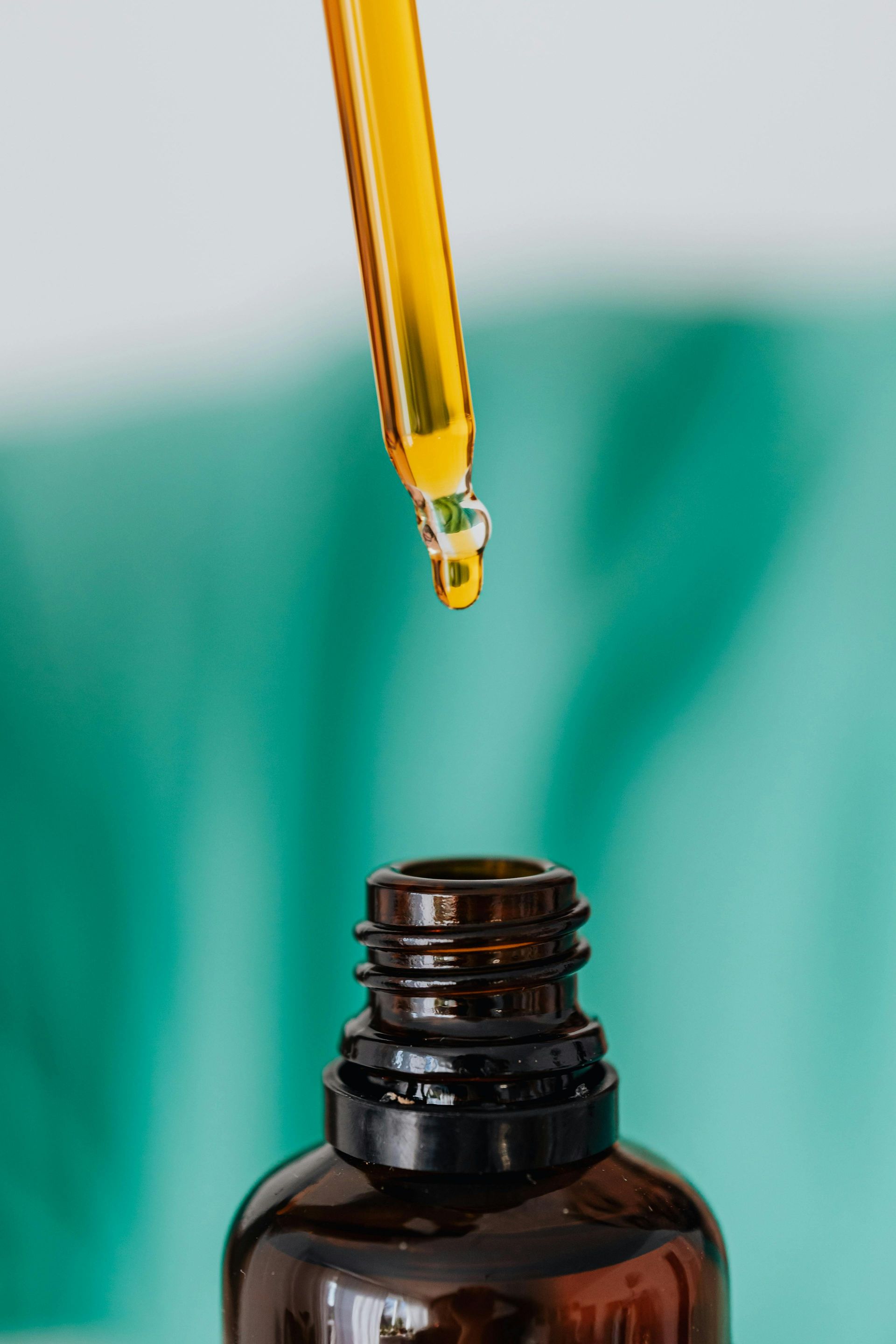The Role of Antioxidants in TPN Formulations for Fertility
Introduction to Antioxidants in Reproductive Health
In the complex landscape of fertility science, the role of antioxidants has gained significant attention due to their potential to mitigate oxidative stress, a key factor impairing reproductive function. Total Parenteral Nutrition (TPN) formulations enriched with antioxidants represent an innovative approach to support reproductive health, especially in cases of deficiency or heightened oxidative stress. This article explores the mechanisms by which antioxidants influence fertility, the specific compounds involved, their biological pathways, and the therapeutic potential of integrating these compounds into clinical nutrition strategies.
Understanding Oxidative Stress and Fertility
What is the role of antioxidants in fertility and reproductive health?
Antioxidants are crucial in maintaining overall reproductive vitality. They act as defenders against oxidative stress, which involves an imbalance between reactive oxygen species (ROS) or free radicals and the body's capacity to neutralize them. Excess ROS can damage DNA, cell membranes, and other cell structures, impairing reproductive cell functions.
In women, antioxidants support several key processes, including oocyte (egg) development, endometrial lining preparation, and hormone regulation essential for ovulation. They activate pathways like Nrf2 and NF-κB that promote cell growth and repair, facilitating endometrial maturation. Proper antioxidant balance improves the quality of eggs and embryos, which is especially important for women over 38 or those undergoing assisted reproductive techniques.
In men, antioxidants such as CoQ10, Vitamin E, NAC, and L-carnitine have been shown to enhance sperm quality by reducing DNA damage, improving motility, shape, and concentration. These compounds help safeguard sperm from oxidative injury, improving overall fertility.
Supplementing with antioxidants, including natural sources like fruits, vegetables, and specific nutrients like selenium, zinc, and vitamins A, C, D, and E, can help compensate for deficiencies. This support optimizes the reproductive environment, reduces the risk of disorders such as endometriosis and PCOS, and increases the chances of successful fertilization and pregnancy.
By protecting reproductive cells from oxidative harm, antioxidants play a pivotal role in ensuring healthy ovulation, fertilization, and embryo development—crucial steps for women and men trying to conceive. Their impact extends to improving outcomes in fertility treatments, demonstrating their importance in reproductive health management.
Antioxidants and Reproductive Pathophysiology
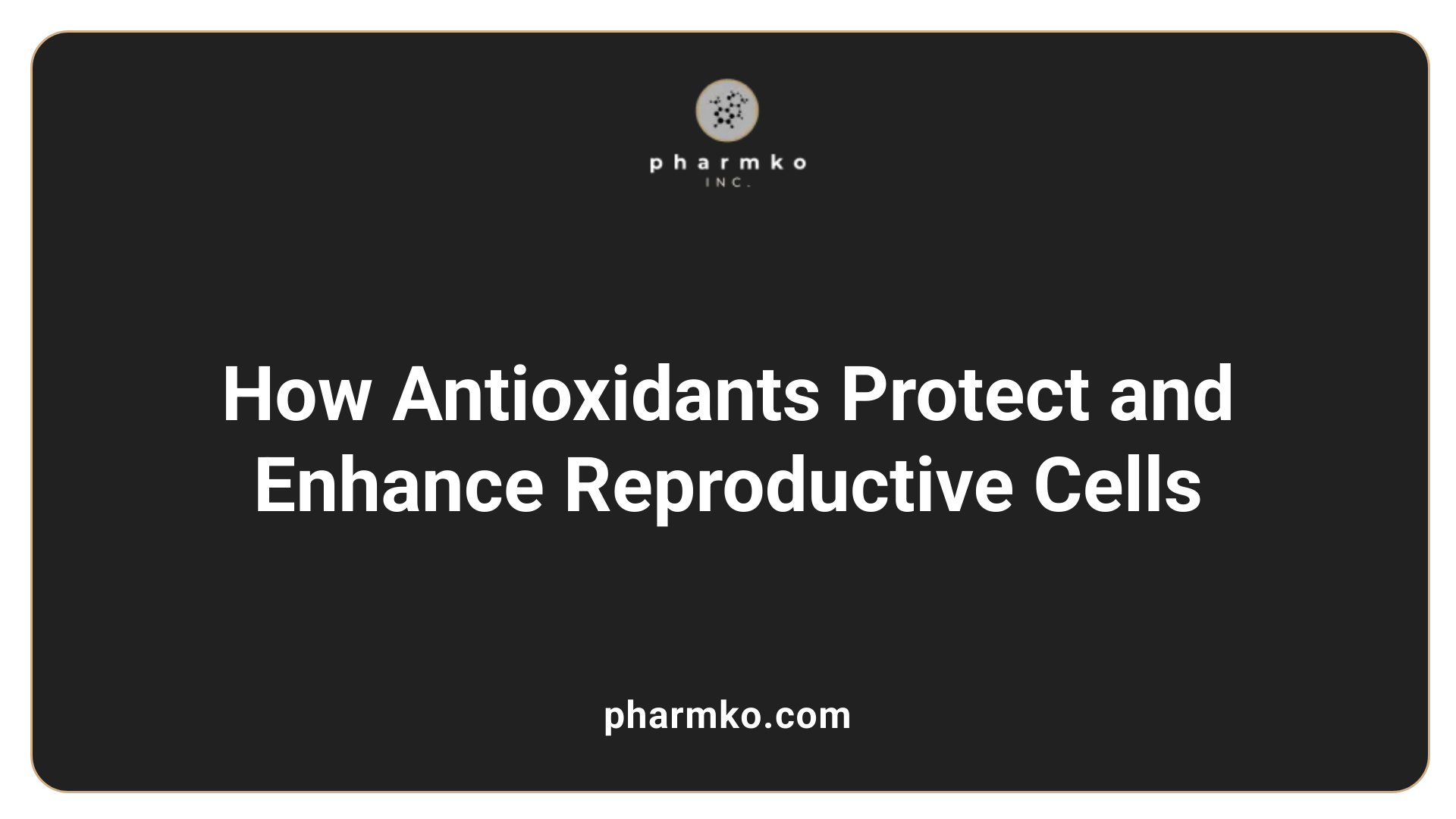
How do antioxidants affect sperm quality and male fertility?
Antioxidants are vital for safeguarding sperm from oxidative damage caused by free radicals, which are unstable molecules resulting from cellular metabolism and environmental exposure. Excess reactive oxygen species (ROS) can harm sperm DNA, impair cell membranes, and disrupt mitochondrial function, ultimately reducing sperm motility, altering morphology, and lowering concentration.
By neutralizing ROS, antioxidants help maintain the structural and functional integrity of sperm cells. This protection enhances DNA stability and improves parameters such as motility and morphology, increasing the chances of successful fertilization.
Several antioxidants have demonstrated beneficial effects on male fertility. Vitamins C and E, selenium, CoQ10, and L-carnitine are among the most studied. Supplementing with these compounds has been linked to improved semen quality and higher pregnancy rates.
In summary, maintaining sufficient antioxidant levels supports sperm health by reducing oxidative stress, thus potentially improving reproductive outcomes for men seeking fertility. This approach underlines the importance of antioxidants not only in female reproductive health but equally in optimizing male fertility conditions.
Mechanisms of Antioxidants in Fertility Enhancement
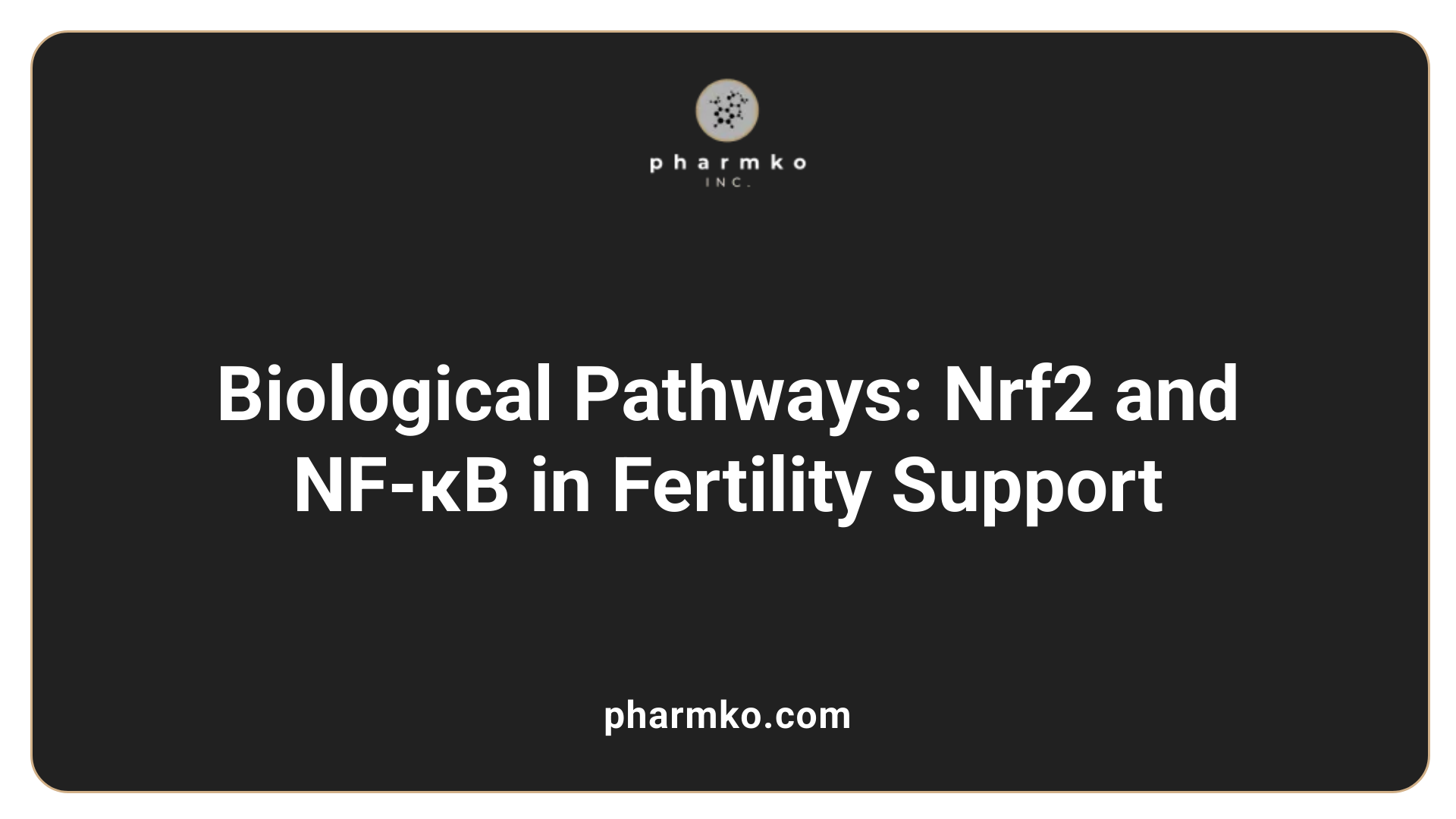
What biological pathways do antioxidants influence to improve fertility outcomes?
Antioxidants play a vital role in improving female reproductive health by influencing several critical biological pathways. One major pathway involves the activation of Nrf2 (nuclear factor erythroid 2-related factor 2), a transcription factor that regulates the expression of numerous antioxidant enzymes. When antioxidants activate Nrf2, they boost the production of enzymes such as glutathione (GSH), superoxide dismutase (SOD), and catalase, which are crucial for neutralizing reactive oxygen species (ROS) and reducing oxidative stress. This enhances the health of oocytes and ovarian cells, supporting proper maturation and function.
In parallel, antioxidants inhibit the NF-κB (nuclear factor kappa-light-chain-enhancer of activated B cells) pathway, which is associated with inflammation. By suppressing NF-κB activity, antioxidants reduce inflammatory responses in reproductive tissues, promoting a receptive endometrium conducive to embryo implantation.
Furthermore, antioxidants help maintain a balanced level of ROS during key reproductive steps such as folliculogenesis, ovulation, fertilization, and embryo development. ROS serve as signaling molecules, but excessive ROS can cause damage to DNA, cell membranes, and other cellular structures.
Through these mechanisms, antioxidants restore redox balance, protect cellular and mitochondrial DNA, and support the hormonal and cellular processes necessary for successful conception. By safeguarding mitochondrial integrity and reducing inflammation, they ultimately contribute to improved fertility rates and reproductive outcomes.
Antioxidants in TPN Formulations for Fertility Support
The development of Total Parenteral Nutrition (TPN) formulations aimed at supporting female and male fertility increasingly involves the inclusion of specific antioxidants. These compounds, such as vitamins A, C, D, E, selenium, Coenzyme Q10 (CoQ10), and melatonin, play crucial roles in safeguarding reproductive cells from oxidative stress.
Antioxidants are organic molecules that neutralize reactive oxygen species (ROS), unstable compounds that can damage DNA, cell membranes, and other vital cell components. By doing so, they help preserve the integrity of gametes—eggs and sperm—and support the complex processes of fertilization and embryo development.
In TPN formulations, antioxidants serve several functions. They activate protective cellular pathways like Nrf2, which boosts the body's own antioxidant defenses, and inhibit pro-inflammatory pathways like NF-κB. This dual action reduces inflammation and cellular damage, creating a healthier environment for reproduction.
Specifically, vitamins and trace elements included in TPN, such as vitamin E and selenium, are essential for enzymatic antioxidant activity that defends tissues from oxidative harm. CoQ10 contributes to efficient energy production within mitochondria, the cell's energy factories, which is vital for the maturation of oocytes and sperm motility.
The overall aim of incorporating antioxidants into TPN is to enhance gamete quality and support early embryo development. For women, this can mean improved oocyte quality and a more receptive endometrium, increasing chances of conception. For men, antioxidant supplementation can improve sperm motility, count, and DNA integrity.
In cases where deficiency or heightened oxidative stress impair fertility, carefully formulated TPN with added antioxidants may help restore optimal reproductive function. The combined effect supports healthier tissue environments, improves cellular resilience, and ultimately contributes to better fertility outcomes.
Safety and Efficacy of Antioxidants in TPN
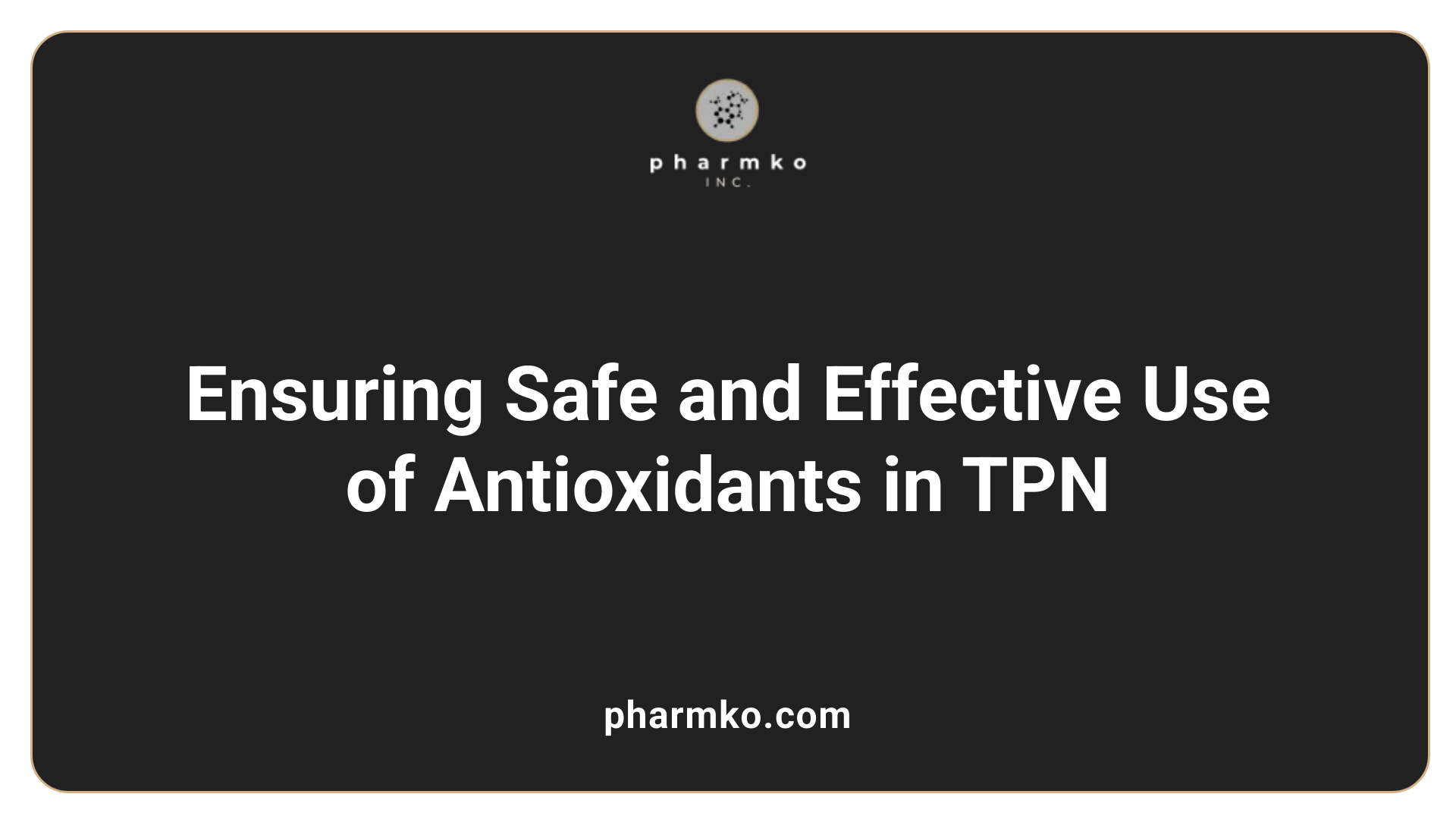 Adding antioxidants to Total Parenteral Nutrition (TPN) formulations may bring notable reproductive benefits by alleviating oxidative stress, a known factor impairing fertility. Oxidative stress damages sperm DNA, reduces egg quality, and hampers embryo development, all of which contribute to infertility issues.
Adding antioxidants to Total Parenteral Nutrition (TPN) formulations may bring notable reproductive benefits by alleviating oxidative stress, a known factor impairing fertility. Oxidative stress damages sperm DNA, reduces egg quality, and hampers embryo development, all of which contribute to infertility issues.
Antioxidants such as vitamins C and E, CoQ10, NAC, selenium, and zinc act by neutralizing free radicals—unstable molecules that cause cellular harm. These compounds support mitochondrial function, vital for energy production in gametes, and help protect DNA and cell membranes from oxidative damage.
Research indicates that supplementing TPN with antioxidants might improve sperm motility, DNA integrity, and overall gamete quality. For women, antioxidants could enhance oocyte quality and embryo viability, especially in conditions like PCOS or endometriosis that involve oxidative imbalance.
However, safety concerns exist if antioxidants are administered improperly. Excessive supplementation can disrupt metabolic balance or cause other adverse effects. Therefore, it is essential that antioxidant addition to TPN is overseen by healthcare professionals, tailoring doses to individual needs.
While current findings are promising, more studies are required to develop standardized protocols and confirm long-term safety. Carefully controlled research will help determine optimal antioxidant types and doses for enhancing fertility through TPN.
In summary, integrating antioxidants into TPN has the potential to support reproductive health, but cautious application and further investigation are necessary to ensure safety and efficacy.
Selenium's Specific Role in Fertility and TPN
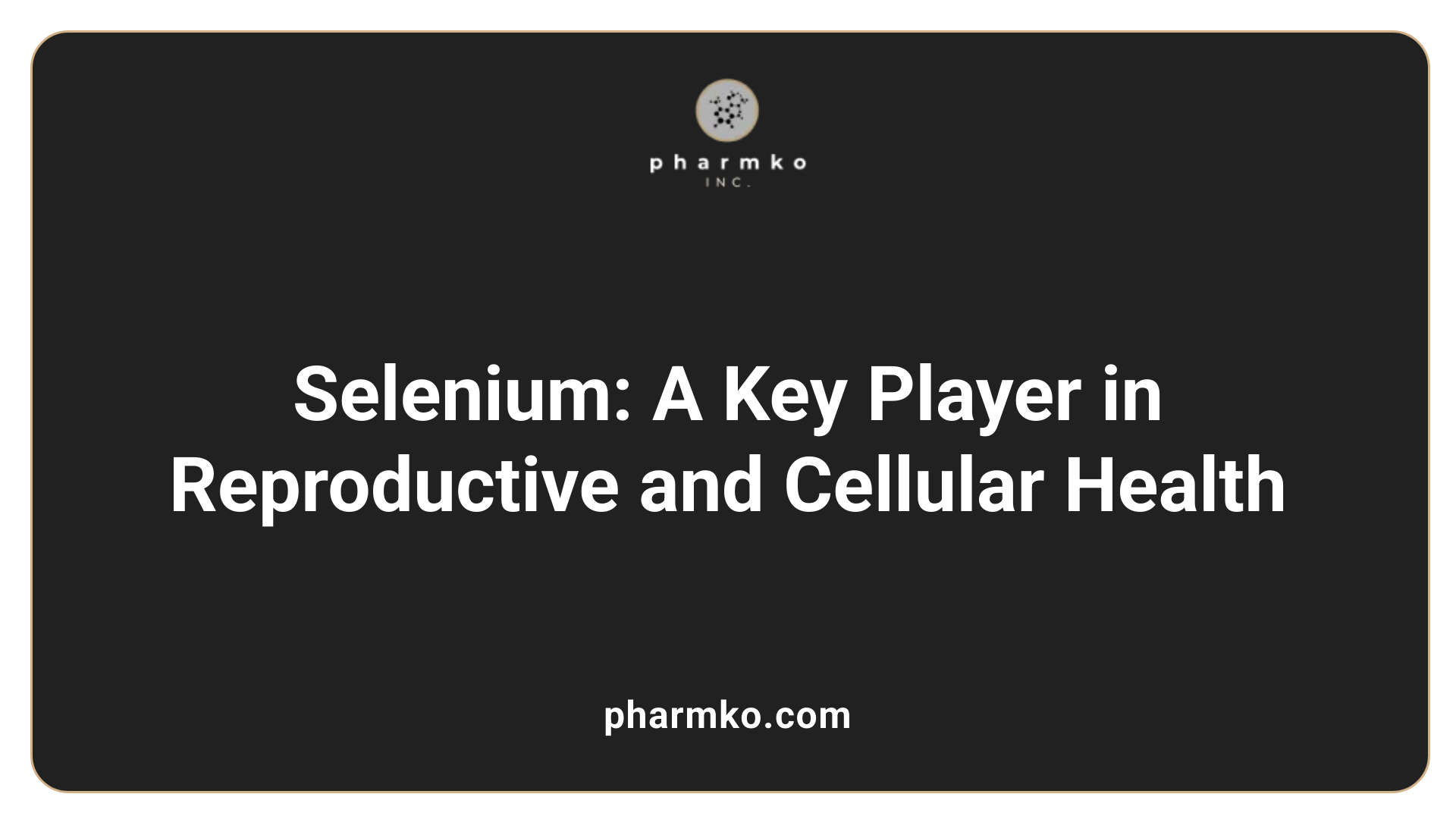 Selenium is an essential trace mineral vital for maintaining overall health and reproductive function. It is incorporated into selenoproteins, which include antioxidant enzymes like glutathione peroxidases that neutralize harmful free radicals, protecting cells from oxidative damage.
Selenium is an essential trace mineral vital for maintaining overall health and reproductive function. It is incorporated into selenoproteins, which include antioxidant enzymes like glutathione peroxidases that neutralize harmful free radicals, protecting cells from oxidative damage.
Dietary sources rich in selenium include Brazil nuts, seafood, meats, grains, and fortified foods. The selenium content in these foods depends heavily on the selenium levels in the soil where they are grown or raised. For most adults, the recommended daily intake is around 55 micrograms, but this dose increases for pregnant and lactating women to support increased nutritional demands.
A deficiency of selenium, although rare in developed countries, can have significant implications for fertility. It may impair immune function and thyroid regulation, both crucial for reproductive health. In some regions with selenium-poor soil, deficiencies are more prevalent and linked to conditions such as Keshan disease. Selenium deficiency may also contribute to poorer sperm quality and reduced egg viability, consequently affecting fertility rates.
In total parenteral nutrition (TPN) formulations, including selenium is particularly important. Adequate selenium levels help alleviate oxidative stress in individuals unable to obtain sufficient nutrients from diet alone. Proper inclusion of selenium in TPN can support immune health, thyroid function, and reproductive capability.
Overall, maintaining adequate selenium levels through diet or supplementation within TPN solutions is a strategic approach to promote reproductive health. Its antioxidant properties reduce cellular damage, potentially improving outcomes in assisted reproductive techniques and natural conception.
Final Remarks on Antioxidants in Fertility Support
Incorporating antioxidants like selenium, vitamins, CoQ10, and melatonin into TPN formulations represents a promising strategy to enhance reproductive health by combating oxidative stress and supporting cellular integrity. While current evidence underscores their therapeutic potential, safety and efficacy depend on proper dosing and personalized treatment plans. Continued research and clinical trials will be critical in establishing standardized protocols and ensuring optimal outcomes for individuals seeking fertility support through antioxidant-enriched TPN solutions.
References
- The Importance of Natural Antioxidants in Female Reproduction - PMC
- Can Antioxidants Improve Fertility? and their benefits for conception
- Role of Antioxidants in Female Fertility
- The Power of Antioxidants for Fertility: Protecting Eggs and Sperm
- Metabolic Effects of Fructose and the Worldwide Increase in Obesity
- Intralipid - an overview | ScienceDirect Topics
- Selenium | IVF1 Fertility
- The Importance of Natural Antioxidants in Female Reproduction - PMC



